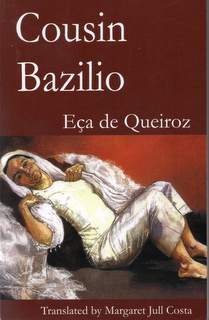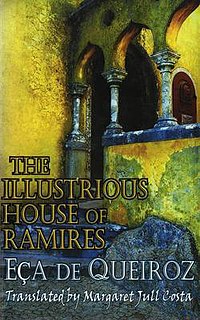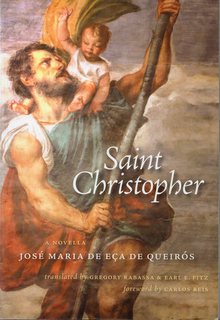 W
WAlves & Co. is a novella by José Maria de Eça de Queirós, also known as Eça de Queiroz. It was only first published in Portuguese in 1925, 25 years after the author's death. The first English version, Alves and Co., was translated by Robert M. Fedorchek and published by the University Press of America in 1988. This was followed by a translation titled The Yellow Sofa, by John Vetch and published by Carcanet Press in 1993. The latest translation, by Margaret Jull Costa, was published by Dedalus Books in 2012, together with six short stories by the same author. Alves & Co. is a comic novella on the theme of infidelity and its consequences.
 W
WThe City and the Mountains is a satirical novel comparing the emptiness of upper class life in Paris with the pleasures found in rural Portugal. It was written in 1895 by José Maria de Eça de Queirós, also known as Eça de Queiroz, when he was living in Paris. The novel was published posthumously in Portuguese in 1901 with a final edit and an ending contributed by his friend, Ramalho Ortigão. The first English version, translated by Roy Campbell, was published by the Ohio University Press in 1967. A new translation by Margaret Jull Costa, was published by Dedalus Books in 2008, and republished in 2018.
 W
WO Primo Basílio is one of the most highly regarded realist novels of the Portuguese author José Maria de Eça de Queiroz, also known under the modernized spelling Eça de Queirós. He worked in the Portuguese consular service, stationed at 53 Grey Street, Newcastle upon Tyne, from late 1874 until April 1879. The novel was written during this productive period in his career, appearing in 1878.
 W
WO Crime do Padre Amaro, subtitled 'Scenes of Religious Life', is a novel by the 19th-century Portuguese writer José Maria de Eça de Queiroz. It was first published in 1875 to great controversy.
 W
WThe Illustrious House of Ramires was the final novel written by the Portuguese writer José Maria de Eça de Queirós (1845-1900) and was published posthumously. A new English translation, by Margaret Jull Costa, was published in 2017, together with an Afterword by the translator. It has been described as a “satiric look at the existential state of Portuguese society on the brink of the modern age”.
 W
WOs Maias: Episódios da Vida Romântica is a realist novel by Portuguese author José Maria de Eça de Queiroz, also known under the modernized spelling Eça de Queirós. Maia is the name of a fictional family, although some episodes fit into the history of the real Maia family.
 W
WThe Mandarin is a novella on the sin of avarice by José Maria de Eça de Queirós, also known as Eça de Queiroz. It was first published in Portuguese in 1880. The first English version, translated by Richard Franko Goldman, was published by The Bodley Head in 1965. A translation by Margaret Jull Costa, was published by Dedalus Books in 1993. A revised version was published by Dedalus in 2009, together with three short stories.
 W
WThe Mystery of the Sintra Road is the first novel published by José Maria de Eça de Queirós, initially as a newspaper serialization in 1870 and subsequently as a book. It was co-written with Ramalho Ortigão. It is considered to be the first Portuguese detective story. An English translation by Margaret Jull Costa and Nick Phillips was published in 2013, and includes an Afterword by Phillips and the Preface to the Third Portuguese edition by the authors.
 W
WThe Relic is a novel written by the Portuguese writer José Maria de Eça de Queirós (1845-1900) and published in 1887. The most recent English translation, by Margaret Jull Costa, was first published in 1994, together with an Introduction by the translator.
 W
WSaint Christopher is a novella by José Maria de Eça de Queirós, also known as Eça de Queiroz, that draws on the legend of Saint Christopher. Written in the 1890s, it was first published posthumously in Portuguese in 1912. The first English version, translated by Gregory Rabassa and Earl E. Fritz, was published by Tagus Press in 2015.
 W
WTo the Capital (Portuguese: A Capital!) is a novel by José Maria de Eça de Queirós, also known as Eça de Queiroz. It was first published posthumously in Portuguese in 1925 following revisions to the text by Eça’s son. The first English version, translated by John Vetch, was published by Carcanet Press in 1997. The novel tells the story of a young man from the Portuguese provinces who dreams of literary fame in the capital, Lisbon, and his experiences in unsuccessfully trying to achieve that fame.
 W
WThe Tragedy of the Street of Flowers is a novel by José Maria de Eça de Queirós, also known as Eça de Queiroz. It was only first published in Portuguese in 1980. The first English version, translated by Margaret Jull Costa, was published by Dedalus Books in 2000, to coincide with the centenary of the author’s death.